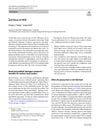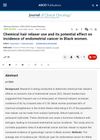36 citations,
January 2016 in “The journal of investigative dermatology/Journal of investigative dermatology” The document concludes that understanding genetic mutations in the PI3K-AKT-mTOR pathway can lead to better diagnosis and treatment for certain genetic skin disorders.
 4 citations,
February 2021 in “Nano select”
4 citations,
February 2021 in “Nano select” MSC-Exos can aid organ development and offer therapeutic benefits for various conditions.
 30 citations,
January 2015 in “BioMed Research International”
30 citations,
January 2015 in “BioMed Research International” Continuous light exposure in rats leads to PCOS-like symptoms and suggests sleep habits might affect the disorder's development.
 18 citations,
October 2021 in “Frontiers in Physiology”
18 citations,
October 2021 in “Frontiers in Physiology” Lipocalin-Type Prostaglandin D2 Synthase (L-PGDS) is a protein that plays many roles in the body, including sleep regulation, pain management, food intake, and protection against harmful substances. It also affects fat metabolism, glucose intolerance, cell maturation, and is involved in various diseases like diabetes, cancer, and arthritis. It can influence sex organ development and embryonic cell differentiation, and its levels can be used as a diagnostic marker for certain conditions.
 1 citations,
September 2017 in “Textual Practice”
1 citations,
September 2017 in “Textual Practice” The document concludes that Hilary Mantel's memoir shows how childhood experiences affect adult health, criticizing modern medicine for ignoring the mental aspects of physical illness.
 243 citations,
October 2003 in “Developmental biology”
243 citations,
October 2003 in “Developmental biology” Ectodin integrates BMP, SHH, and FGF signals in developing ectodermal organs.
 20 citations,
September 2020 in “International journal of computer applications”
20 citations,
September 2020 in “International journal of computer applications” The Random Forest algorithm was the most accurate at diagnosing Polycystic Ovarian Syndrome.
17 citations,
January 2004 in “European journal of obstetrics, gynecology, and reproductive biology/European journal of obstetrics & gynecology and reproductive biology” Certain hormone medications can treat symptoms like acne and unwanted hair, regulate periods, and prevent pregnancy in women and teenage girls.
4 citations,
June 1990 in “Postgraduate medicine” Medication can effectively reduce hair growth and improve life quality for women with hirsutism.
 1 citations,
January 2017 in “International journal of women's health and reproduction sciences”
1 citations,
January 2017 in “International journal of women's health and reproduction sciences” Electroacupuncture improved symptoms of PCOS in a 19-year-old woman.
 May 2021 in “Histochemistry and Cell Biology”
May 2021 in “Histochemistry and Cell Biology” The May issue discussed publishing agreements and four studies on cholesterol in hair, cancer cell changes, hormones in the uterus, and skin protein effects.
 61 citations,
January 2017 in “Human Reproduction Open”
61 citations,
January 2017 in “Human Reproduction Open” The review recommends hormone replacement therapy for women with premature ovarian insufficiency to manage symptoms and protect health, with specific approaches for different groups.
 2 citations,
September 2004 in “Fertility and sterility”
2 citations,
September 2004 in “Fertility and sterility” High androgen levels can cause excessive hair growth and may indicate serious health issues, including heart disease and fertility problems.
 6 citations,
August 2023 in “European journal of endocrinology”
6 citations,
August 2023 in “European journal of endocrinology” The 2023 guideline advises a detailed approach for PCOS, focusing on early detection, lifestyle and medical treatments, and managing health risks.
 January 2024 in “Endocrine and metabolic science”
January 2024 in “Endocrine and metabolic science” Different types of PCOS need specific diagnosis methods and treatments.
 August 2024 in “Research Square (Research Square)”
August 2024 in “Research Square (Research Square)” Using 5-alpha reductase inhibitors may lower the risk of breast cancer in females.
 June 2024 in “Journal of Clinical Oncology”
June 2024 in “Journal of Clinical Oncology” Frequent use of chemical hair relaxers may increase endometrial cancer risk in Black women.
 July 2022 in “International journal of medical science and clinical invention”
July 2022 in “International journal of medical science and clinical invention” Women with irregular periods should be checked for PCOS and treated early to prevent complications, with birth control pills helping to manage symptoms.
 8 citations,
February 2020 in “Fertility and Sterility”
8 citations,
February 2020 in “Fertility and Sterility” Operative hysteroscopy is still the main treatment for Asherman syndrome, but more research is needed on post-surgery methods.
 May 2022 in “bioRxiv (Cold Spring Harbor Laboratory)”
May 2022 in “bioRxiv (Cold Spring Harbor Laboratory)” The enzyme 5α-reductase is important for proper blood vessel development during the fertility-related transformation of the uterus lining.
 July 2015 in “NEJM Journal Watch”
July 2015 in “NEJM Journal Watch” Diagnosing and treating PCOS in young people is difficult.
 12 citations,
March 2015 in “Pediatric Dermatology”
12 citations,
March 2015 in “Pediatric Dermatology” Early diagnosis and treatment of PCOS in young people is important to prevent long-term health problems.
 1 citations,
November 2023 in “American journal of clinical pathology”
1 citations,
November 2023 in “American journal of clinical pathology” Transgender men on testosterone therapy need ongoing gynecologic care due to potential cancer risks.
 June 2023 in “Journal of multidisciplinary sciences (Online)”
June 2023 in “Journal of multidisciplinary sciences (Online)” PCOS is linked to a higher risk of endometrial cancer but not ovarian or breast cancer, and more research is needed on its role in cancer development and treatment effects.
 4 citations,
March 2021 in “Case Reports”
4 citations,
March 2021 in “Case Reports” A woman's excessive hair growth and masculine features were due to a rare benign ovarian tumor and endometrial cancer, which improved after surgery.
 April 2023 in “Elsevier eBooks”
April 2023 in “Elsevier eBooks” PCOS is a hormonal disorder causing symptoms like excess hair, acne, irregular periods, and fertility issues.
 43 citations,
October 2019 in “Pediatric Research”
43 citations,
October 2019 in “Pediatric Research” Lifestyle changes are the main treatment for PCOS, which is a complex condition requiring early management to reduce its health impacts.
May 2010 in “Deleted Journal” PCOS causes menstrual issues, infertility, and long-term health risks.
 March 1965 in “Hospital Topics”
March 1965 in “Hospital Topics” Chemotherapy provides symptom relief and extends life in 30-50% of gynecological cancer cases, but has only cured choriocarcinoma.
 5 citations,
May 2019 in “Hormone and Metabolic Research”
5 citations,
May 2019 in “Hormone and Metabolic Research” Women with nonclassic 21-hydroxylase deficiency can have successful pregnancies through IVF, with certain factors affecting their chances.

























